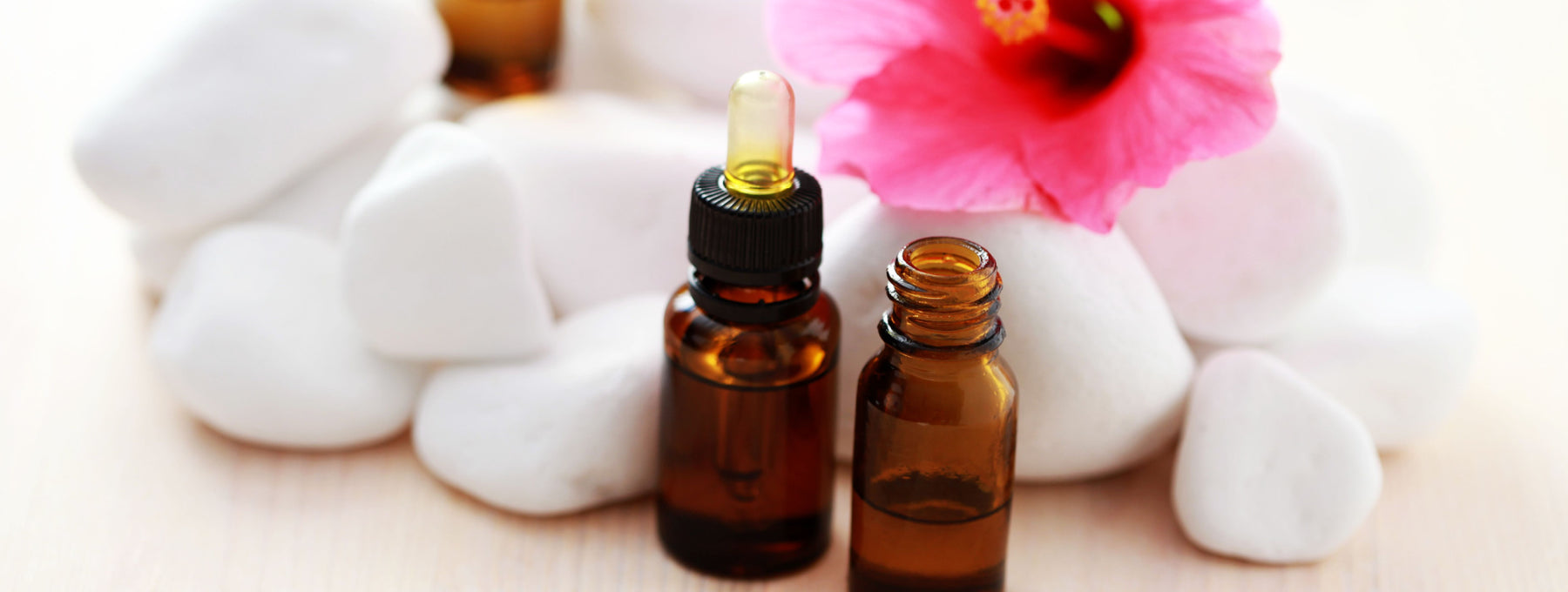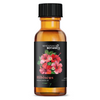
Hibiscus Oil Benefits and Uses for Hair and Skin
The Hibiscus flower has been used as a medicinal herb since ancient times. It has been highly valued across cultures around the globe, its praises sung from Egypt to China.
The plant’s petals and leaves were used to make herbal tea, a concoction that was believed to possess medicinal properties. Hibiscus tea was reputed to cure ailments, such as managing high blood pressure, high cholesterol, and health conditions related to the liver. Modern medicine has corroborated these long-held beliefs about Hibiscus tea and extracts, with several studies supporting their use to treat hypertension and high cholesterol.
In the current day, there are nearly a hundred species of Hibiscus, many of which are hybridized plants. The different species of Hibiscus have diverse uses, spanning decorative, medicinal, and culinary applications. Another use of the Hibiscus plant is for the derivation of its essential oil. Hibiscus essential oil is now widely popular as an ingredient in beauty regimens, known for its restorative and rejuvenative properties.
This article discusses the medicinal properties of Hibiscus essential oil, exploring its benefits and uses in hair care and skincare.
Hibiscus Essential Oil vs. Hibiscus Infusion

You’ll find Hibiscus oil in many forms. The most common options include Hibiscus carrier oil, Hibiscus infusion, and Hibiscus essential oil. All of these different forms are mostly extracted from two species of Hibiscus, namely Hibiscus rosa sinensis and Hibiscus sabdariffa. The differences between the forms of Hibiscus oil arise from differences in their production.
Hibiscus essential oils are derived from the Hibiscus petals and seeds. The oil is commonly extracted through solvent extraction or steam distillation methods. Both processes yield a concentrated oil that purely contains Hibiscus plant compounds. As a result, the essential oil retains the full therapeutic benefits of the Hibiscus plant.
Hibiscus infusion or Hibiscus-infused oil is made by letting Hibiscus plant parts sit in a carrier oil. To infuse, the herbs and carrier oil mixture is kept at room temperature for around 6 weeks. The longer the plant parts sit in the oil, the stronger the aroma. Infused oils are still milder than essential oils in terms of scent, flavor, and therapeutic effect. They can be applied directly on bare skin. Biologically, Hibiscus-infused oil consists of a combination of properties from both the plant parts and the carrier oil, making it non-neutral in nature.
Hibiscus Essential Oil Origins
Hibiscus essential oil is derived most commonly from Hibiscus rosa sinensis and Hibiscus sabdariffa species. Historically, both of these species have been used for similar medicinal purposes. The species belong to the Malvaceae plant family, a family of commercially popular flowering plants including cotton, cacao, and okra. The flower petals and the seeds are Hibiscus parts known to contain biologically important chemicals and are hence when extracting the essential oil.
Hibiscus rosa sinensis, admired worldwide for its large, brightly colored blossoms, is believed to have originated in the Indian subcontinent. The plant is a small tree that grows between 3 to 5 meters. In comparison to other species used for essential oil, the therapeutic benefits of Hibiscus rosa sinensis are better documented in modern medicinal use. Research has concluded its benefits for anti-aging, managing obesity, cholesterol, and blood pressure.
The other commonly used species is Hibiscus sabdariffa, which is native to Africa. It is a relatively smaller plant, growing to a height of 2 to 3 meters. It is commercially produced in China, Thailand, and parts of Africa.
There has been significant scientific interest in the therapeutic effects of essential oils derived from both species. Numerous studies have examined the effects of Hibiscus essential oil on hair, skin, and general health.
Hibiscus Essential Oil for Hair
Hibiscus essential oil is a popular ingredient in hair products, as it comprises many hair-nourishing compounds. It is used in hair masks, shampoos, and leave-in hair products. Hibiscus has several benefits for hair supported by scientific research, including reducing hair fall, strengthening hair, and cleansing the scalp.
Boosts Hair Growth
In ancient medicine, Hibiscus was used as a treatment for bald spots. A 2003 study published in the Journal of Ethnopharmacology examined the effects of 1 percent Hibiscus extract on hair growth. The length of hair in different hair growth phases was observed, and it was found that the flower and leaf extract demonstrated significant improvement in hair growth.
Additionally, Hibiscus essential oil contains ascorbic acid (vitamin C) in abundance. Ascorbic acid is known to increase the absorption of iron and promote the production of collagen, thereby supporting hair growth. Hence, Hibiscus essential oil may be used for boosting hair growth.
To use, you can dilute Hibiscus essential oil in carrier oils that promote hair health, such as coconut oil, argan oil, and jojoba oil.
May Treat Dandruff
Hibiscus extract has been used in Indian Ayurvedic medicine for improving scalp health. It may also be used to treat dandruff as it is known to have antimicrobial and anti-inflammatory properties. It contains tannins, alkaloids, and flavonoids, which are all bioactive compounds with anti-bacterial and inflammatory effects. These properties may alleviate symptoms of dandruff, including itching and flaking of the scalp.
Hibiscus oil can also be used to nourish the scalp, as it contains a chemical compound known as mucilage. This is an emollient that increases moisture levels in the skin and softens it, improving conditions such as dandruff and dry scalp.
To use Hibiscus essential oil to treat dandruff, add it to a mixture of aloe vera and tea tree essential oil. Apply as a mask.
Potentially Reduces Gray Hair
Hibiscus essential oil has good potential to be a remedy for graying hair. The petals of Hibiscus rosa sinensis contain 20% flavonoids, bioactive compounds with antioxidant properties. Antioxidants are known as anti-aging compounds and help, not only reduce, but also reverse the effects of UV-induced damage to the hair and scalp.
According to a study conducted in 2021, exposure to UVA radiation significantly reduces the melanocytes in the hair follicles, cells that are responsible for hair pigmentation. Antioxidants, when used via topical application and ingestion, are effective in improving melanocyte activity both in mature cells and younger cells.
To reduce graying hair, add a few drops of Hibiscus essential oil to your shampoo and conditioner.
Hibiscus Essential Oil for Skin
Hibiscus essential oil is highly valued for its positive effects on the skin. Packed with nourishing compounds, Hibiscus essential oil finds its place in various skincare products, including moisturizers, serums, and face masks. It has numerous advantages for the skin, such as providing antioxidant protection, improving complexion, and healing the skin.
Repairs Sun Damage
Hibiscus essential oil has the potential to protect the skin from symptoms of sun damage. It contains an abundance of antioxidant compounds which prevent oxidative stress and aging.
The effects of sun damage to the skin manifest through symptoms such as fine lines and sun spots. The symptoms result from an increased amount of oxidants, causing inflammation and affecting the production of collagen in the skin. This leads to a loss in skin elasticity and vitality.
This essential oil may help with reducing the appearance of fine lines by boosting collagen production. The ascorbic acid it contains is vital for the production of collagen in the skin and improving elasticity. When incorporating Hibiscus essential oil in skincare, dilute it in rosehip seed oil, another source of vitamin C. Make sure to patch test before applying the oil blend to your skin.
May Enhance and Even Out Skin Tone
A common skin concern that many people experience is dull and uneven skin tone. This is caused by a variety of factors, including sun exposure, dehydration, and poor diet. Hibiscus essential oil can be used to restore the skin’s radiance, and improve skin tone through antioxidant and tyrosinase-inhibiting compounds, namely ascorbic acid and flavonoids. These chemical compounds have a synergistic skin-brightening effect that has been evidenced in a research paper.
Hibiscus essential oil also contains exfoliating acids, including citric acid and malic acid. These acids brighten skin by increasing cell turnover and removing dead cells in the top layer of the skin. The exfoliating effect reveals fresh skin that is not damaged by the environment and UV rays.
For optimal application, add Hibiscus essential oil to a carrier oil rich in fatty acids, such as argan oil or apricot oil. This combination can reduce dullness by combining an exfoliant with a hydrating ingredient.
Can Improve Skin Hydration and Elasticity
There is a growing focus among skincare brands to formulate products that improve skin moisture levels and skin barrier health. Maintaining adequate moisture levels in the skin also reduces the appearance of fine lines and improves elasticity.
Hibiscus essential oil is great for both of these concerns, as it encourages the synthesis of the key ingredient that solves both of these concerns: collagen. A review article published in 2022 synthesized results from 12 studies conducted on the effect of collagen when applied topically. The review confirmed that topical collagen is effective in improving skin moisture, elasticity, and hydration.
To leverage the collaging boosting properties of Hibiscus essential oil, combine it with argan oil and add it to your moisturizer. You can also apply the diluted mixture on its own.
Hibiscus Essential Oil Side Effects
Despite its prevalent use for medicinal and cosmetic purposes, Hibiscus essential oil has many side effects and drug interactions.
Hibiscus essential oil is not meant for ingestion, even when diluted. If consumed, the essential oil may lower systolic blood pressure. For patients diagnosed with high or low blood pressure, it is best to practice caution when diffusing Hibiscus essential oil.
Avoid using Hibiscus essential oil topically if you are allergic to other plants from the Malvacceae family. Direct contact with Hibiscus may cause skin rashes or contact dermatitis.
Hibiscus essential oil may also interact with, and dampen the effectiveness of, certain medications, such as drugs for regulating blood pressure and diabetes, as well as antimalarial drugs. If you currently take any of these medications, speak with a medical professional before diffusing or inhaling Hibiscus essential oil.
Some varieties of Hibiscus are toxic to pets, so it is best to exercise caution when diffusing or using the oil topically around them. Pregnant women and children are also advised to avoid using Hibiscus essential oil.
Final Considerations on Hibiscus Essential Oil

Although empirical studies on the essential oil form of Hibiscus are still emerging, a substantial body of research supports the therapeutic applications of Hibiscus tea and extracts. The application of Hibiscus essential oil beauty regimens is backed by theoretical evidence. This essential oil is abundant in antioxidant, anti-inflammatory, and antimicrobial compounds, making it suitable for incorporation in haircare and skincare routines.
In order to ensure that you reap the full benefits of Hibiscus essential oil, make sure to buy from a trusted retailer. Our Hibiscus essential oil is responsibly sourced with renewable practices, ensuring that you get the highest quality compounds.
